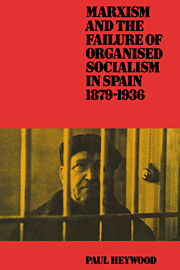Book contents
- Frontmatter
- Contents
- Preface
- Abbreviations used in text
- 1 Decaffeinated Marxists: the PSOE, 1879–1914
- 2 Reform, revolution and the roots of rupture: the PSOE, 1914–1919
- 3 Socialist schism and the development of organised Communism, 1919–1923
- 4 Dealing with a Dictator: organised Socialism, 1923–1931
- 5 Marxist mistakes: misinterpreting the Second Republic, 1931–1934
- 6 Marxism marginalised: the PSOE and the creation of the Popular Front, 1934–1936
- Conclusion
- Notes
- Bibliography
- Index
6 - Marxism marginalised: the PSOE and the creation of the Popular Front, 1934–1936
Published online by Cambridge University Press: 08 September 2009
- Frontmatter
- Contents
- Preface
- Abbreviations used in text
- 1 Decaffeinated Marxists: the PSOE, 1879–1914
- 2 Reform, revolution and the roots of rupture: the PSOE, 1914–1919
- 3 Socialist schism and the development of organised Communism, 1919–1923
- 4 Dealing with a Dictator: organised Socialism, 1923–1931
- 5 Marxist mistakes: misinterpreting the Second Republic, 1931–1934
- 6 Marxism marginalised: the PSOE and the creation of the Popular Front, 1934–1936
- Conclusion
- Notes
- Bibliography
- Index
Summary
In broad terms, the Socialist-led insurrectionary strike movement of October 1934 was a failure throughout all of Spain, collapsing rapidly everywhere except in Asturias, where it was brutally suppressed by Moorish troops led by General Francisco Franco. It would be difficult, though, to exaggerate the significance for the Left within the Republic, and ultimately for the Republic itself, of the events of October 1934. While the immediate aftermath of the abortive rising saw the trial and imprisonment of several Socialist leaders, as well as of the Republican leader, Manuel Azaña Díaz, the longer-term repercussions were profound and farreaching. Most obviously, the fact that only in Asturias had there been any hint of success underlined the importance of genuine united action. That the Asturian mine-workers had been able to hold out for two weeks was obviously a reflection of their courage and commitment; however, it was also due in large measure to the presence of the CNT within a local Alianza obrera which approximated more closely than most to Joaquín Maurín's original conception. Moreover, the widespread imprisonment of workers’ leaders, together with the call by CEDA ministers for the execution of Asturian miners' leaders Belarmino Tomás and Ramón González Peña, provided the Left with a powerful cause around which to unite. The commutation of any death sentences became an immediate and urgent aim, while the call for the release and pardon of all those involved in the October rising was to become a central plank of leftist politics throughout 1935.
- Type
- Chapter
- Information
- Publisher: Cambridge University PressPrint publication year: 1990



